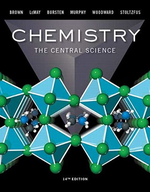?Consider the decomposition of liquid benzene, \(\mathrm{C}_{6} \mathrm{H}_{6}(l)\), to gaseous acetylene, \(\mathrm{C}_{2} \mathrm{H}_{2}(g)\) :
Chapter 5, Problem 5.48(choose chapter or problem)
Consider the decomposition of liquid benzene, \(\mathrm{C}_{6} \mathrm{H}_{6}(l)\), to gaseous acetylene, \(\mathrm{C}_{2} \mathrm{H}_{2}(g)\) :
\(\mathrm{C}_{6} \mathrm{H}_{6}(l) \longrightarrow 3 \mathrm{C}_{2} \mathrm{H}_{2}(g) \quad \Delta H=+630 \mathrm{~kJ}\)
(a) What is the enthalpy change for the reverse reaction?
(b) What is \(\Delta H\) for the formation of \(1 \mathrm{~mol}\) of acetylene?
(c) Which is more likely to be thermodynamically favored, the forward reaction or the reverse reaction?
(d) If \(\mathrm{C}_{6} \mathrm{H}_{6}(g)\) were consumed instead of \(\mathrm{C}_{6} \mathrm{H}_{6}(l)\), would you expect the magnitude of \(\Delta H\) to increase, decrease, or stay the same? Explain.
Text Transcription:
C6H6(l)
C2H2(g)
C6H6(l) \longrightarrow 3 C2H2(g) \Delta H = +630 kJ
\Delta H
Unfortunately, we don't have that question answered yet. But you can get it answered in just 5 hours by Logging in or Becoming a subscriber.
Becoming a subscriber
Or look for another answer
